- Home
- James Carol
Watch Me (Jefferson Winter 2) Page 7
Watch Me (Jefferson Winter 2) Read online
Page 7
‘When did the oil run out?’
‘A couple of decades ago.’
‘Morgan Holdings, is it still owned by the Morgans?’
Taylor nodded. ‘Lock, stock and barrel. This is one family business that’s staying in the family.’
‘And judging by the Gulfstream, the company’s doing all right for itself.’
‘Yeah, you could say that. Its net worth is easily into ten figures. And it’s just had a bumper payday. Dayton sits on top of the Haynesville Shale, so the Morgans got in on the recent gas boom. It’s been known for a while that the gas was there, but it was too expensive to get to. Improvements in technology and drilling techniques have changed all that.’
‘So who’s in charge of the company these days?’
Taylor smiled. The tension was gone and he’d stopped doing that thing with his fingers on the steering wheel. We were back on safer ground again. Whatever the set-up was now, the present didn’t bother Taylor anywhere near as much as the past. I could relate.
‘Technically it’s Clayton Morgan. He’s been the CEO since his father, Jasper, stepped down a few years back. Jasper is still the president. It’s supposed to be an honorary position, but the general consensus is that he still calls the shots.’
‘Okay, that answers the who. What about the why? Why did Morgan Holdings lend their Gulfstream to you guys?’
‘Because Jasper Morgan stepped down to become Eagle Creek’s mayor. Anything that happens to the town, he takes personally. Very personally indeed. He loves this place like it’s his own flesh and blood. When he saw the film he told us to do whatever we needed to do to catch this guy. Money was no object. He gave us a complete free rein. He wants this guy brought down hard and fast. Dead or alive, he doesn’t care. He just wants him put out of business.’
That explained Sheriff Fortier’s reaction when we were discussing my fee. At least I now knew whose signature was at the bottom of my blank cheque.
14
Sam Galloway’s McMansion sat on its own five-acre plot amongst all the other big houses in McArthur Heights. A black wrought-iron fence set on a four-foot brick wall marked the boundary. The top of the fence curved gently. Smooth, long curves that reminded me of the way a kid would draw a bird.
A row of trees had been planted to shield the house from the street, but they still had some growing to do. They weren’t quite tall enough, the foliage wasn’t quite thick enough, and we kept getting flickering glimpses of the house as we cruised along the boundary.
Taylor pulled up at a big set of double gates. Like the boundary fence, they were also made from black wrought iron. Unlike the fence, they made me think of a prison rather than a kid’s drawing. They were ten feet tall with rose patterns wound into the metalwork. Our police cruiser was a solid enough piece of American engineering, but if we tried to ram those gates we’d definitely come off worse.
The driver’s window went down and a wave of superheated air came crashing in. There was a microphone on a column like you’d see at a drive-through restaurant. No keypad. The only way you were getting in was if someone up at the house let you in, or you had a remote-controlled gate key. Taylor reached through the window and hit the buzzer. One beat, two beats, then a click and static.
‘Can I help you?’
A female voice. Maybe Sam’s wife, or maybe the maid. The sound was scratchy and lacked any sort of bass definition, making it difficult to tell.
‘Sheriff’s department. We need to talk with Mrs Galloway.’
Another click, then the static died and the gates slowly parted. The silence coming in through the window was eerie. There was no sound whatsoever. It was too hot for the insects and the birds, and there was no wind to stir the leaves and the branches. Taylor shut the window as the gates finished opening and we headed up the long winding driveway.
A large antebellum plantation house came into view by degrees. By the time the air-conditioning had dispersed the heat, we could see the whole building in its full glory. Sam might have worked at the dull end of the law, but it had certainly paid well. The house was impressive. It had the columns and the symmetry. There were an equal number of windows on both sides of the wide entrance porch and all those windows were exactly the same size. The white brickwork glowed bright and celestial in the harsh sunlight.
But the white was too white, and everything about the house was just that little bit too perfect for this to be the real deal. There was no way this house dated back to before the Civil War. Even a building that had been loved and cherished was going to show some signs of wear and tear after two centuries.
Taylor drove slowly. A thin ribbon of blacktop stretched out in front of us, and the pristine green grass flowing gently away on either side reminded me of a cemetery. All that was missing were the headstones.
We followed the road around to the side of the house where a three-car garage was hidden away behind a tall hedge. Taylor pulled up next to a brand-new top-of-the-range Mercedes and killed the engine.
We got out of the car and the heat was enough to take my breath away. Although it was nearing 6 p.m. the temperature was still in the high eighties, maybe even pushing ninety. Taylor took out his cellphone and checked the website. 06:19:23. White numbers on a black background and another stick figure dangling from a noose.
Unless there was a major break in the case, this guy was going to be adding a second corpse to his body count very soon. That was the problem when you were dealing with an unsub who was a cop. They were perfectly placed to mislead the investigation, to push resources in a direction they wanted rather than a direction that would yield results. It was like going into a boxing ring wearing handcuffs. What we needed was a miracle. The problem was that I believed in miracles as much as I believed in luck.
The front door was already open when we reached it, a maid waiting to show us in. The interior of the house was cool and cavernous, big and open like a church. Every light was burning, but they seemed dull after the supernova brightness outside.
We followed the maid through the entrance hall, past a wide stairway that was made from dark wood and had a bright crimson carpet. The deeper into the house we went, the cooler it got, like we were burrowing underground. The maid stopped at a door, knocked once, then pushed it open and stepped aside to let us past.
The room was large with expensive-looking furniture and no personality. All the drapes were drawn to keep out the worst of the heat, and the elaborate crystal chandelier above our heads scattered jewels of light across the wooden floor. That chandelier was impressive, but it had more serious competition from the ornate fireplace and the Steinway to be the room’s focal point. For me, the piano won hands down. Steinway make beautiful pianos. I had a strong urge to go and play it, but this was neither the time nor the place.
Barbara Galloway was standing beside the fireplace. She was exquisitely beautiful, like a china doll but without the fragility. Early forties, brunette, hazel eyes. She was dressed casually in jeans and a plain black blouse. The details of her grief were evident in a dozen different ways, some subtle, some not so subtle. She wasn’t wearing make-up, and the only jewellery she had on was her engagement ring and a wedding band. She kept twisting the wedding ring around and around, but I doubted she was aware of this.
There was a space on her wrist where her watch should have been. When your world comes crashing to an abrupt halt, time ceases to have any real meaning. Every second is filled with thoughts and memories of the dead. Hours become your own personal hell. There was a small forgotten coffee stain on the front of her jeans that would not have been there under normal circumstances. Her eyes were bloodshot and heavy.
The painting hanging above her showed the whole family. Sam, Barbara and the three kids. No smiles and serious faces, because this was a portrait rather than a photograph. Taylor had said the kids were aged ten to fifteen, but those in the portrait were younger than that by two or three years. Barbara’s eyes followed mine to the painting.
&
nbsp; ‘The children are staying with my parents.’
The statement was ambiguous and irrelevant, a way to fill the silence. Right now her parents could be in Miami or New York or Chicago. They might not even be in the country. Not that it mattered where they were. We weren’t here to see them or the kids.
‘We need to ask some questions, if that’s okay.’
‘Of course. Please sit down.’
She waved us towards a sofa that wouldn’t have looked out of place in the Palace of Versailles. Taylor took one end and I took the other. Barbara Galloway was in a matching chair that had been positioned at ninety degrees to the sofa. She’d angled herself so she could face us, legs crossed, hands placed primly on her lap.
‘I have spoken to the police already.’
‘I’m aware of that, Mrs Galloway. I just have a few additional questions.’
‘You’re not from around here, are you?’
‘No, ma’am. My name’s Jefferson Winter. The sheriff’s department has called me in to consult on this case.’
She stared for a moment at my Hendrix T-shirt and my hair, then her gaze found my eyes.
‘My husband called me at around five o’clock yesterday evening to tell me he was working late and wouldn’t be home for dinner. This wasn’t unusual. My husband often works late. Usually he’s back by nine, though, so when he hadn’t got home by ten I started to worry. I tried his cellphone but it went straight through to his voicemail.’
The information was unsolicited, and felt rehearsed. A statement rather than any sort of actual answer. I wondered how often Sam had worked late, and how often he’d ‘worked late’. A rich guy like him, living the Southern plantation owner cliché, I would be surprised if he didn’t have a mistress.
Barbara Galloway struck me as a strong woman, a proud woman, but she was teetering on the brink. Right now she needed the denial, she needed to keep that mask in place. I could break her down easily enough, but that would have been unnecessarily cruel. There were truths here that we could find elsewhere. Barbara had arrived in hell‚ and assuming she was going to survive this‚ it would take a long time to get back. It wasn’t my job to add to her agony.
15
‘Mrs Galloway,’ I began. ‘What I’m trying to do here is build up a picture of what your husband was like.’
‘Was,’ she whispered. She was gazing down at her hands, the wedding band turning around and around. She looked up, searching for my eyes, stared deep into them. This level of scrutiny would have been uncomfortable if I hadn’t been used to it. ‘How long does it take for the present tense to become the past tense?’
‘That depends on how much you loved the person. If you hated them the crossover can be instantaneous. If you loved them, that’s another matter altogether. For some people it takes months, for others, years. And then there are a few people who never make that transition.’
I hesitated, wondering how far I should go with this. Wondering how much Barbara needed to hear, and how much she could take.
‘Please,’ she said. ‘Just say what’s on your mind.’
I hesitated a moment longer then said‚ ‘Some people get stuck in time. For them the world stops turning when they get that phone call or that midnight knock on the door. It doesn’t matter what they do, they can’t move on. Then again, they don’t try too hard. Survivor guilt keeps them locked in the past. Ten years after the event, fifteen years, and they still lay an extra place at the table.’
I was thinking of my mother. She was the wife of a killer rather than the wife of a victim, but, in every way that mattered, her situation had been identical to Barbara Galloway’s. My mother had never come to terms with what my father was, or what he had done. On numerous occasions, usually when she was drunk, she had laid an extra place at the dinner table. Whenever that happened, I’d just sit down at the table and eat whatever she’d served up and do my best to ignore the elephant sharing the room with us.
There was one other group that I hadn’t mentioned to Barbara, the ones where the pain of living got so bad they couldn’t go on. My mother had belonged to that group, too. She’d been labelled an alcoholic, but suicide can take many different forms.
‘Thank you for your honesty‚ Mr Winter. I appreciate it. You said you had some questions?’
Her smile was strained. Good manners had been instilled into her since the cradle. Even now, she couldn’t help herself. No matter how hard you try, how hard you run, you can’t escape who you are.
‘Run me through a typical day for your husband.’
The flash of surprise that flickered across Barbara’s face was there and gone in the blink of an eye. The mask of grief slid back into place. She would have endured plenty of questions since the sheriff’s department got hold of that film clip, and I had a pretty good idea of the direction those questions had taken.
Shepherd and his men would have hit things head-on. They would have focussed on Sam Galloway’s last day on the planet, and the reason they would have started there was because they were desperate to make sense of a situation that went way outside their usual frame of reference. They were trying to bring some equilibrium back into that tiny little space that Eagle Creek occupied in the universe. By piecing together Sam Galloway’s final hours they would have been hoping to find a way to turn back time. They wanted things back to how they’d been before Sam went up in flames.
But time can’t be reversed. It doesn’t matter what the theoretical physicists would have you believe, that’s not how things work in the real world. In the real world, time marches resolutely forward. There is nothing anyone can do to change that fact. The tides come in and soak the feet of kings, and the hours, minutes and seconds move inexorably into the future, and that’s just the way it is.
‘A typical working day starts at around seven.’ Barbara realised what she’d said and corrected herself. ‘Started at around seven. While Sam showered and got dressed, I’d wake the children and start getting them ready for school. Then we’d all sit down for breakfast. Sam always had cereal.’
For a second I thought she might lose it. She took a deep breath, shook off her grief, and pulled herself back together. The transformation was impressive, a display of sheer will trumping emotion.
‘If he was in court he’d leave the house around eight. Otherwise he tended to leave around quarter after eight. He always tried to get home for six whenever possible so we could eat dinner together as a family.’ Barbara met my eye. ‘Family meant everything to him.’
‘But, like you said earlier, he often worked late.’
Barbara nodded. ‘He dealt with everything except criminal law, which, believe me, even in a small place like Eagle Creek, meant he kept busy. The law firm was founded by Sam’s grandfather. After he died, Sam’s father took it over, and then Sam. Three generations of continuous ownership by one family. We’d always thought that our son would take over when my husband retired. Maybe we’ll be able to find a way to ensure that still happens.’
Her voice trailed off and whatever she was about to say next was lost in the silence.
‘What about weekends?’
‘Saturday mornings Sam played golf. Sundays were for family. We would usually visit my parents, or Sam’s mother.’
‘Did he ever work weekends?’
‘Hardly ever. He did his best to keep weekends free so we could spend some quality time together as a family. I’m sorry, Mr Winter. Do you have many more questions? I’m finding this rather difficult.’
‘Just one. If you only had one word to describe your husband, what word would you choose?’
Barbara thought about this for a moment. ‘Honest. He was the most honest man I’d ever met.’
16
Taylor found first gear and we pulled away from that brand-new top-of-the-range Mercedes. The air-conditioning was running full blast, but the car still felt like an oven. We passed the front of the house and turned onto the driveway and drove back towards the main gates. Heat shimmered u
p from the road in front of us and a rolling sea of perfect green stretched out on either side. That big white pretend plantation mansion slowly shrank in the car’s side mirror.
The gates were already wide open when we got there. The maid had probably hit the button when she heard us coming around to the front of the house, timing it just right. She’d probably done the same for Sam Galloway. Sam had been a busy man, a man who often worked late, a man who didn’t have time to waste hanging around waiting for the gates to open.
Taylor hung a right and we retraced our way back to Eagle Creek, steady and slow and sticking to the speed limit. I didn’t get it. Taylor was driving like he had Miss Daisy in the back. One of the few perks of being a cop was that you didn’t have to worry about tickets.
‘What did you make of Barbara Galloway?’ asked Taylor.
‘She’s a gold digger.’
He glanced over, an incredulous expression on his face. ‘And how do you figure that?’
‘You’ve seen the photographs. Sam wasn’t exactly an oil painting. Barbara, on the other hand, is. She looks good now, she would have been stunning when they first met. She could have had her pick of men, and she chose Sam. Why? Because he was loaded.’
‘Maybe they married for love. It does happen, you know.’
‘Not in this case. The love came later. I don’t doubt that for a second. In her own way, Barbara loved Sam. I’ve seen plenty of grieving widows, and her grief was real. But she married Sam for money and status, not for love.’
Taylor was looking at me like he was about to slap down a winning hand. ‘You’re wrong. Barbara Galloway is not a gold digger.’

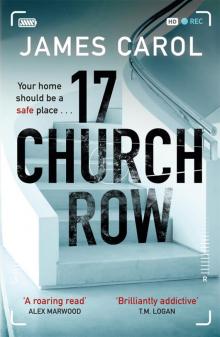 17 Church Row
17 Church Row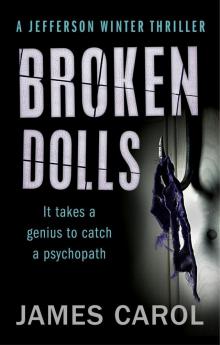 Broken Dolls (A Jefferson Winter Thriller)
Broken Dolls (A Jefferson Winter Thriller)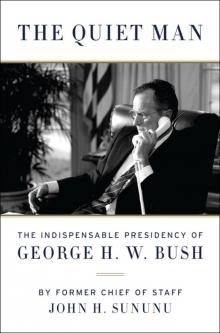 The Quiet Man
The Quiet Man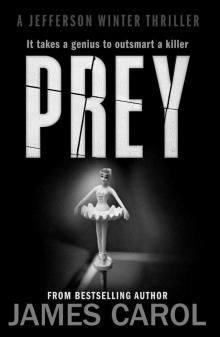 Prey (Jefferson Winter)
Prey (Jefferson Winter)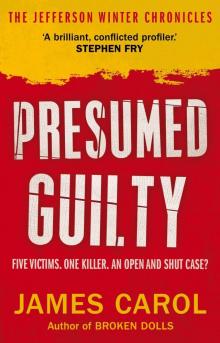 Presumed Guilty: (A Jefferson Winter novella)
Presumed Guilty: (A Jefferson Winter novella) Hush Little Baby
Hush Little Baby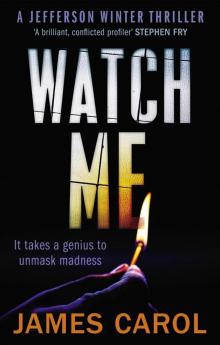 Watch Me (Jefferson Winter 2)
Watch Me (Jefferson Winter 2)